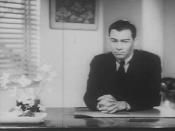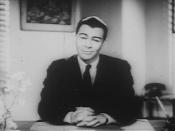In my opinion, the narrator in this story was very jealous, egocentric and close-minded. He was like a few people I know, in that he could be proved wrong about anything, and not admit the fault. The blind man in the story was a friend of his wife, and I think that he was uncomfortable having him as a guest in his house. I can't say that I blame him for his jealousy; anyone would be in a similar situation.
Antipathy has a couple of different meanings, and to a degree, they both contribute to the plot. The first definition says that antipathy is a feeling of intense aversion. It applies to the story because the narrator, like many people, tend to steer clear of situations where they would have to try something new, or be in the company of someone who is "different", whether it be physically or mentally.
The second definition states that antipathy is a feeling of intense dislike. The narrator, up until he began talking about cathedrals to the blind man, simply didn't like his wife's friend.
He was motivated to overcome negative feelings toward the blind man to please his wife. He also changed his attitude because after spending time with the blind man, he realized that they were not so different after all. He had prejudged the man just like many people before him. By prejudging the man's personality because he was blind, the narrator fell into the same hole that contains all stereotypes. In this story the narrator was able to get past some of those stereotypes, although the cannabis might have been a contributing factor. For the sake of argument, however, one could say that his character grew a little morally, sober or not.





